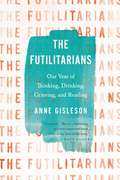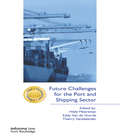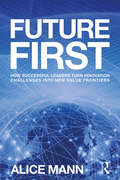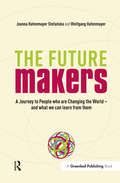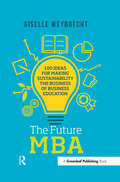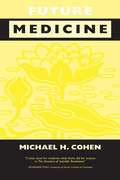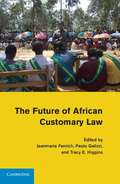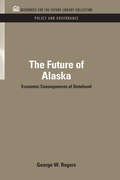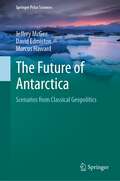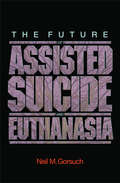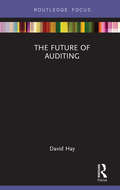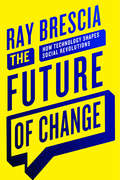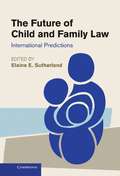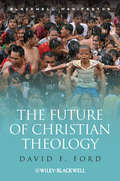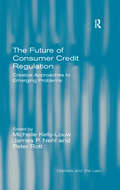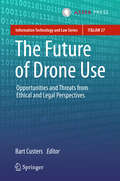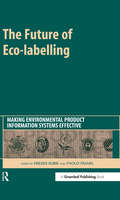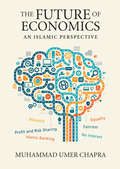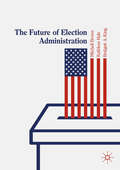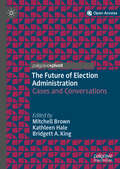- Table View
- List View
Fußspuren von Feist in der europäischen Datenbankrichtlinie: Eine rechtliche Analyse der Gesetzgebung zum geistigen Eigentum in Europa
by Indranath GuptaIm Zusammenhang mit der Rechtsprechung zur Urheberrechtsfähigkeit einer Tatsachenzusammenstellung werden in diesem Buch die Fußspuren des in einer Entscheidung des Obersten Gerichtshofs der USA (Feist) vorgesehenen Standards in Europa ausfindig gemacht. Insbesondere wird untersucht, inwieweit diese Rechtsprechung mit dem in der Europäischen Union angenommenen und diskutierten Standard übereinstimmt. Oftmals bleiben die Gründe für die Rechtsetzung unbemerkt. Die zwingenden Umstände und die Geschichte, die dem Erlass eines Gesetzes vorausgehen, helfen dabei, die Ausgewogenheit einer bestimmten Gesetzgebung zu verstehen. Bei der Betrachtung des Prozesses der Verabschiedung der Datenbankrichtlinie (96/9/EG) wird in diesem Buch über die Bedenken nachgedacht, die im Zusammenhang mit der Feist-Entscheidung in Europa geäußert wurden.
The Futilitarians: Our Year of Thinking, Drinking, Grieving, and Reading
by Anne GislesonRecommended Summer Reading -- Louise Erdrich, New York TimesA memoir of friendship and literature chronicling a search for meaning and comfort in great books, and a beautiful path out of griefAnne Gisleson had lost her twin sisters, had been forced to flee her home during Hurricane Katrina, and had witnessed cancer take her beloved father. Before she met her husband, Brad, he had suffered his own trauma, losing his partner and the mother of his son to cancer in her young thirties. "How do we keep moving forward," Anne asks, "amid all this loss and threat?" The answer: "We do it together." Anne and Brad, in the midst of forging their happiness, found that their friends had been suffering their own losses and crises as well: loved ones gone, rocky marriages, tricky childrearing, jobs lost or gained, financial insecurities or unexpected windfalls. Together these resilient New Orleanians formed what they called the Existential Crisis Reading Group, jokingly dubbed "The Futilitarians." From Epicurus to Tolstoy, from Cheever to Amis to Lispector, each month they read and talked about identity, parenting, love, mortality, and life in post-Katrina New Orleans, gatherings that increasingly fortified Anne and helped her blaze a trail out of her well-worn grief. Written with wisdom, soul, and a playful sense of humor, The Futilitarians is a guide to living curiously and fully, and a testament to the way that even from the toughest soil of sorrow, beauty and wonder can bloom.
Future Challenges for the Port and Shipping Sector (The Grammenos Library)
by Hilde Meersman Thierry Vanelslander Eddy Van De VoordeFuture Challenges for the Port and Shipping Sector discusses the issues that most influence the future of the maritime and port industries. Important topics covered in this book include: Maritime trade, future trade flows, evolutions in international trade, shipping capacity and demand Developments in ship construction and their economic consequences Future developments in ports: technology and economics The future role of port authorities The future development in ports Financial developments This book looks at shipping from an holistic point of view and will be especially compelling in these challenging times.
Future First: How Successful Leaders Turn Innovation Challenges into New Value Frontiers
by Alice MannFuture First is a practical guide for any business leader who wants to build, expand, or reinvent their company by finding new value in global challenges. Traditional companies often view issues like income equality, global warming, and resource scarcity as "problems." By contrast, future first leaders understand them as opportunities, as innovation challenges. Through real-life business examples ranging from Nike to Opower, this book lays out how to identify and adopt the future first leadership mindset and business capabilities required to achieve lasting and integrated performance results. Future First examines how leaders from companies including Unilever, Etsy, Revolution Foods, Method Products, and others have adopted this mindset toward innovation and people practices, accelerating business ecosystem transformation. Alice Mann, an organizational psychologist with twenty years of experience consulting and coaching on executive leadership, organization design, and business transformation, interviewed scores of business leaders to understand how their companies are expanding into new value frontiers. Future First makes a convincing argument that successful partnerships and alliances among big global companies and small mission-driven ones can reshape the global ecosystems of apparel, food, automobiles, and energy, and remake the future of our world.
Future Forsaken: Abuses Against Children Affected by HIV/AIDS in India
by Human Rights WatchThis 209-page report documents how many doctors refuse to treat or even touch HIV-positive children. Some schools expel or segregate children because they or their parents are HIV-positive. Many orphanages and other residential institutions reject HIV-positive children or deny that they house them. Children from families affected by AIDS may be denied an education, pushed onto the street, forced into the worst forms of child labor, or otherwise exploited, all of which puts them at greater risk of contracting HIV.
The Future Makers: A Journey to People who are Changing the World – and What We Can Learn from Them
by joanna Hafenmayer wolfgang HafenmayerAre you looking for sense and meaning in your work? Would you like to be successful but expect more in the way of reward and fulfilment than just a paycheque? The Future Makers offers 23 encouraging responses to these questions. It tells the diverse stories of people from around the world who have made a sustainable mark on the world through their careers: from an American financial market specialist to tree planters in Africa; from Japanese environmental experts to dancers in Argentina. The Future Makers are people who make the world a better, more beautiful and livable place for current and coming generations. The Hafenmayers present these inspiring stories in an accessible, entertaining and thoughtful way. But they also do far more. The book presents a toolkit on how you can forge a career that has a positive impact on the world. This step-by-step process has already had a life-changing impact on readers of the original German edition. It is packed with helpful suggestions for personal development and reorientation – for a work life that will make you happier and deeply satisfied. The Future Makers takes you on a journey to people whose values and visions aren't compartmentalized into corners of their lives. They live their dreams every day. This book will show you how you can do the same.
The Future MBA: 100 Ideas for Making Sustainability the Business of Business Education (The Principles for Responsible Management Education Series)
by Giselle WeybrechtThe Future MBA brings together 100 ideas on how to rethink management education in order to embed sustainability. This book acts as a creative toolkit for individuals working in management education on how to design new and innovative products, services, and experiences for the business school community with a focus on sustainability. What if we took a moment to stand back and look at the bigger picture? What would the business school of the future look like? Rather than a roadmap, the 100 ideas presented in this book are meant to be a source of inspiration in responding to these questions. Some ideas could be put into practice tomorrow, some would require a complete reassessment of the way we view business education, and others are meant to encourage more ideas… and more action, to turn management education into a key player in moving the sustainability agenda forward.
Future Medicine: Ethical Dilemmas, Regulatory Challenges, and Therapeutic Pathways to Health Care and Healing in Human Transformation
by Michael H. CohenFuture Medicineis an investigation into the clinical, legal, ethical, and regulatory changes occurring in our health care system as a result of the developing field of Complimentary and Alternative Medicine (CAM). Here Michael H. Cohen describes the likely evolution of the legal system and the health care system at the crossroads of developments in the way human beings care for body, mind, emotions, environment, and soul. Through the use of fascinating and relevant case studies, Cohen presents stimulating questions that will challenge academics, intellectuals, and all those interested in the future of health care. In concise, evocative strokes, the book lays the foundation for a novel synthesis of ideas from such diverse disciplines as transpersonal psychology, political philosophy, and bioethics. Providing an exploration of regulatory conundrums faced by many healing professionals, Cohen articulates the value of expanding our concept of health care regulation to consider not only goals of fraud control and quality assurance, but also health care freedom, integration of global medicine, and human transformation. Future Medicineprovides a fair-minded, illuminating, and honest discussion that will interest hospice workers, pastoral counselors, and psychotherapists, as well as bioethicists, physicians and allied health care providers, complementary and alternative medical providers (such as chiropractors, acupuncturists, naturopaths, massage therapists, homeopaths, and herbalists), and attorneys, hospital administrators, health care executives, and government health care workers. Michael H. Cohen is Director for Legal Programs, the Center for Research and Education in Complementary and Integrative Medical Therapies, Beth Israel Deaconess Medical Center, Harvard Medical School.
The Future of African Customary Law
by Jeanmarie Fenrich Paolo Galizzi Tracy E. HigginsCustomary laws and traditional institutions in Africa constitute comprehensive legal systems that regulate the entire spectrum of activities from birth to death. Once the sole source of law, customary rules now exist in the context of pluralist legal systems with competing bodies of domestic constitutional law, statutory law, common law, and international human rights treaties. The Future of African Customary Law is intended to promote discussion and understanding of customary law and to explore its continued relevance in sub-Saharan Africa. This volume considers the characteristics of customary law and efforts to ascertain and codify customary law, and how this body of law differs in content, form, and status from legislation and common law. It also addresses a number of substantive areas of customary law including the role and power of traditional authorities; customary criminal law; customary land tenure, property rights, and intestate succession; and the relationship between customary law, human rights, and gender equality.
The Future of Aging
by Gregory M. Fahy L. Steven Coles Michael D West Stephen B. HarrisJust as the health costs of aging threaten to bankrupt developed countries, this book makes the scientific case that a biological "bailout" could be on the way, and that human aging can be different in the future than it is today. Here 40 authors argue how our improving understanding of the biology of aging and selected technologies should enable the successful use of many different and complementary methods for ameliorating aging, and why such interventions are appropriate based on our current historical, anthropological, philosophical, ethical, evolutionary, and biological context. Challenging concepts are presented together with in-depth reviews and paradigm-breaking proposals that collectively illustrate the potential for changing aging as never before. The proposals extend from today to a future many decades from now in which the control of aging may become effectively complete. Examples include sirtuin-modulating pills, new concepts for attacking cardiovascular disease and cancer, mitochondrial rejuvenation, stem cell therapies and regeneration, tissue reconstruction, telomere maintenance, prevention of immunosenescence, extracellular rejuvenation, artificial DNA repair, and full deployment of nanotechnology. The Future of Aging will make you think about aging differently and is a challenge to all of us to open our eyes to the future therapeutic potential of biogerontology.
The Future of Alaska: Economic Consequences of Statehood (RFF Policy and Governance Set)
by George RogersThis book is both a discussion of key decisions Alaskans must make in coming years and a case study of problems of public finance and policy that accompany shifts in power. Originally published in 1962
The Future of Antarctica: Scenarios from Classical Geopolitics (Springer Polar Sciences)
by Jeffrey McGee David Edmiston Marcus HawardAs global great power competition intensifies, there is growing concern about the geopolitical future of Antarctica. This book delves into the question of how can we anticipate, prepare for, and potentially even shape that future? Now in its 60th year, the Antarctic Treaty System has been comparatively resilient and successful in governing the Antarctic region. This book assesses how our ability to make accurate predictions about the future of the Antarctic Treaty System reduces rapidly in the face of political and biophysical complexity, uncertainty, and the passage of time. This poses a critical risk for organisations making long-range decisions about their policy, strategy, and investments in the frozen south. Scenarios are useful planning tools for considering futures beyond the limits of standard prediction. This book explores how a multi-disciplinary focus of classical geopolitics might be applied systematically to create scenarios on Antarctic futures that are plausible, rigorous, and robust. This book illustrates a pragmatic, nine-step scenario development process, using the topical issue of military activities in Antarctica. Along the way, the authors make suggestions to augment current theory and practice of geopolitical scenario planning. In doing so, this book seeks to rediscover the importance of a classical (primarily state-centric) lens on Antarctic geopolitics, which in recent decades has been overshadowed by more critical perspectives. This book is written for anyone with an interest in the rigorous assessment of geopolitical futures - in Antarctica and beyond.
The Future of Assisted Suicide and Euthanasia
by Neil M. GorsuchThe Future of Assisted Suicide and Euthanasia provides the most thorough overview of the ethical and legal issues raised by assisted suicide and euthanasia--as well as the most comprehensive argument against their legalization--ever published. In clear terms accessible to the general reader, Neil Gorsuch thoroughly assesses the strengths and weaknesses of leading contemporary ethical arguments for assisted suicide and euthanasia. He explores evidence and case histories from the Netherlands and Oregon, where the practices have been legalized. He analyzes libertarian and autonomy-based arguments for legalization as well as the impact of key U.S. Supreme Court decisions on the debate. And he examines the history and evolution of laws and attitudes regarding assisted suicide and euthanasia in American society. After assessing the strengths and weaknesses of arguments for assisted suicide and euthanasia, Gorsuch builds a nuanced, novel, and powerful moral and legal argument against legalization, one based on a principle that, surprisingly, has largely been overlooked in the debate--the idea that human life is intrinsically valuable and that intentional killing is always wrong. At the same time, the argument Gorsuch develops leaves wide latitude for individual patient autonomy and the refusal of unwanted medical treatment and life-sustaining care, permitting intervention only in cases where an intention to kill is present. Those on both sides of the assisted suicide question will find Gorsuch's analysis to be a thoughtful and stimulating contribution to the debate about one of the most controversial public policy issues of our day.
The Future of Asylum in the European Union
by Flora A.N.J. Goudappel Helena S. RaulusThis book is based on a conference on the future of the European asylum policy at Erasmus School of Law in Rotterdam, the Netherlands. After a challenge set by the Dutch State Secretary for Justice, Ms Nebahat Albayrak, the contributions to this book focus on human rights aspects of the European asylum policy and the way the EU Member States need to cooperate in the future in order to reach results. The authors are scholars, policy makers and representatives of NGOs. In this way, many different aspects of the problems are put forward. In the introduction and the conclusion the editors evaluate the results of this broad cooperation. Valuable for academics, practitioners, policymakers and NGO's involved with European asylum policy issues.
The Future of Auditing (Routledge Focus on Accounting and Auditing)
by David HayThe Future of Auditing provides a concise overview of the function of auditing and the future challenges it faces, underpinned with suggestions for future research. It evaluates the key challenges facing the profession, such as quality, competition, and governance, as well as highlighting the under-explored areas of ethics, fraud, and judgement. The emphasis throughout is on the value of audit, and the importance of auditing research. Providing an original assessment of global versus national auditing, evidence-based auditing standards, and the structure of professional firms, David Hay critically examines the value of auditing from different standpoints. He critically reviews current assumptions about the value of audits of financial statements, and explores research opportunities and priorities to improve understanding of the value of auditing and its future role and function. This authoritative but accessible guide to the future of auditing and the challenges it faces will be useful not only to auditing researchers, but also to policy makers, standard setters, financial journalists, and auditing professionals seeking an accessible overview of current and future issues in auditing.
The Future of Change: How Technology Shapes Social Revolutions
by Ray BresciaIn The Future of Change, Ray Brescia identifies a series of "social innovation moments" in American history. Through these moments—during which social movements have embraced advances in communications technologies—he illuminates the complicated, dangerous, innovative, and exciting relationship between these technologies, social movements, and social change. Brescia shows that, almost without fail, developments in how we communicate shape social movements, just as those movements change the very technologies themselves.From the printing press to the television, social movements have leveraged communications technologies to advance change. In this moment of rapidly evolving communications, it's imperative to assess the role that the Internet, mobile devices, and social media can play in promoting social justice. But first we must look to the past, to examples of movements throughout American history that successfully harnessed communications technology, thus facilitating positive social change. Such movements embraced new communications technologies to help organize their communities; to form grassroots networks in order to facilitate face-to-face interactions; and to promote positive, inclusive messaging that stressed their participants' shared dignity and humanity. Using the past as prologue, The Future of Change provides effective lessons in the use of communications technology so that we can have the best communicative tools at our disposal—both now and in the future.
The Future of Child and Family Law
by Elaine E. SutherlandChild and family law tells us much about how a society operates, since it touches the lives of everyone living in that society. In this volume, a variety of experts examine child and family law in thirteen countries – Australia, Canada, China, India, Israel, Malaysia, The Netherlands, New Zealand, Norway, Russia, Scotland, South Africa and the United States. Each chapter identifies the imperatives and influences that have prevailed to date and offers informed predictions of how it will develop in the years to come. A common chapter structure facilitates comparison of the jurisdictions and, in the introduction, the editor highlights common trends and salient differences. The Future of Child and Family Law therefore provides practitioners, academics and policy-makers with access not just to an overview of child and family law in a range of countries around the world, but also to insights into what has shaped it and options for reform.
The Future of Christian Theology (Wiley-Blackwell Manifestos #55)
by David F. FordThe Future of Christian Theology represents a personal manifesto from one of the world's leading theologians, exploring the ways Christian theology in the twenty-first century has been, and can now continue to be, both creative and wise. Represents an outstanding and engaging account of the task of theology today Offers an insightful description of what makes for discerning and creative theology. Written from the perspective of decades of experience, and in close dialogue with theologians of other faiths Features a strong interfaith and public theology dimension, and a contemporary portrait of the field from the inside A hopeful and illuminating search for wisdom and understanding in the increasingly complex religious and secular world of the twenty-first century.
The Future of Civil Litigation
by Laura Ervo Anna NylundThis book offers an analysis of the current trends and developments in Nordic civil litigation and is divided into four main parts. In the first part a picture of the current civil litigation landscape is provided by focusing on whether there is a truly Nordic form of civil litigation, the current state of Nordic civil litigation, the recent major reforms of civil procedure legislation and the effects of Europeanization. In the second part, the way rules on court-connected mediation have been implemented and practiced in the Nordic countries is discussed. The authors offer their insights on why court-connected mediation has not been fully embraced by Nordic lawyers and the Nordic approach to this type of mediation is contrasted with the Austrian and German approaches. In the third part, recent developments affecting access to justice in the Nordic countries are discussed. Among the topics are changes in legal aid schemes, the impact of recent civil procedure law reforms, hindrances for larger companies to use litigation as a method of dispute resolution and differences in costs and delays. Additionally, Alternative Dispute Resolution and Class or Group Actions are explored as methods to enhance access to justice. The potential adverse effects of Alternative Dispute Resolution and Group Actions are also examined, both in a Nordic and European context. In the final part, conclusions are drawn from both historical and future-oriented perspectives.
The Future of Consumer Credit Regulation: Creative Approaches to Emerging Problems (Markets and the Law)
by Michelle Kelly-Louw Peter RottEffective regulation of consumer credit in modern society is an ever-changing challenge. As new forms of credit emerge in free societies, regulation often lags behind. This volume explores contemporary problems related to the regulation of consumer credit in market economies with a focus on credit extended to the most vulnerable and poorest members of the community. Written by experts in the field of consumer credit regulation from Europe, North America, Australia and South Africa, the book examines some of the most important consumer credit issues facing consumers today and proposes innovative ways to protect the consumer interest in those markets.
The Future of Drone Use
by Bart CustersGiven the popularity of drones and the fact that they are easy and cheap to buy, it is generally expected that the ubiquity of drones will significantly increase within the next few years. This raises questions as to what is technologically feasible (now and in the future), what is acceptable from an ethical point of view and what is allowed from a legal point of view. Drone technology is to some extent already available and to some extent still in development. The aim and scope of this book is to map the opportunities and threats associated with the use of drones and to discuss the ethical and legal issues of the use of drones. This book provides an overview of current drone technologies and applications and of what to expect in the next few years. The question of how to regulate the use of drones in the future is addressed, by considering conditions and contents of future drone legislation and by analyzing issues surrounding privacy and safeguards that can be taken. As such, this book is valuable to scholars in several disciplines, such as law, ethics, sociology, politics and public administration, as well as to practitioners and others who may be confronted with the use of drones in their work, such as professionals working in the military, law enforcement, disaster management and infrastructure management. Individuals and businesses with a specific interest in drone use may also find in the nineteen contributions contained in this volume unexpected perspectives on this new field of research and innovation. Bart Custers is Associate Professor and Head of Research at eLaw, the Center for Law and Digital Technologies at Leiden University, The Netherlands. He has presented his work at international conferences in the United States, China, Japan, the Middle East and throughout Europe and has published over 80 scientific, professional and popularizing publications, including three books.
The Future of Eco-labelling: Making Environmental Product Information Systems Effective
by Frieder Rubik Paolo FranklEco-labelling is one of the key tools used by policy-makers in many parts of the world to encourage more sustainable production and consumption. By providing environmental information on products and services, eco-labels address both business users and consumers and range from mandatory approaches, such as required product declarations, to voluntary approaches, such as national eco-labels. Eco-labels can play an important role in environmental policy. They reward and promote environmentally superior goods and services and offer information on quality and performance with respect to issues such as health and energy consumption. Eco-labels fit well into a multi-stakeholder policy framework – as promulgated recently by the EU's integrated product policy (IPP) – since the development of criteria for labels and the acceptance in the market requires the involvement of a wide range of different parties, from government and business, to consumers and environmental organisations. However, many eco-labelling schemes have had troubled histories, and questions have been raised about their effectiveness. So, are eco-labels an effective tool to foster the development, production, sale and use of products and to provide consumers with good information about the environmental impacts of those products? Is eco-labelling useful to business as a marketing tool? What factors contribute to the development of successful schemes? More than ten years after its establishment, can the EU Flower be considered a success? Are national eco-labels such as the German Blue Angel and the Norwegian White Swan more effective? Should eco-labels be harmonised? Are eco-labels achieving their original aim of fostering sustainable production and consumption? For which product groups are ISO type I eco-labels appropriate and inappropriate? Are other labels, such as mandatory, ISO type II and ISO type III labels more effective in some cases? Are eco-labels focusing on the main environmental policy targets or just on "low-hanging fruit"? Are eco-labels really linked to other tools of IPP? The Future of Eco-labelling provides answers to all of these questions. Based on a major EU research exercise, the book plots a course for policy-makers to address some of the historic problems with eco-labelling, to learn what works and what doesn't and to move forward with schemes that can make a real difference to sustainable production and consumption.The book analyses the conditions under which eco-labelling schemes-both mandatory and voluntary-are or can become an efficient and effective tool to achieve given objectives; assesses previous experiences with eco-labels in different European countries and the relationship of these schemes with business strategies, IPP and market conditions; defines strategies aimed at linking eco-labels with other IPP measures; explores how eco-labels can be used to encourage sustainable consumption patterns, create green markets, foster innovation and development of green products and services, and implement multi-stakeholder initiatives; and sets out detailed recommendations for the future of eco-labelling.The book will be required reading for policy-makers, businesses involved with eco-labelling schemes and researchers interested in the development of sustainable production and consumption and IPP worldwide.
The Future of Economics: An Islamic Perspective
by M. Umer ChapraThis profound book is a powerful yet balanced critique of mainstream economics that makes a forceful plea for taking economics out of its secular and occident-centred cocoon. It presents an innovative and formidable case to re-link economics with moral and egalitarian concerns so as to harness the discipline in the service of humanity.M. Umer Chapra is ranked amongst the Top 50 Global Leaders in Islamic economics (ISLAMICA 500, 2015) and has been awarded with two prestigious awards for his contributions to the field: Islamic Development Bank Award for Islamic Economics (1989) and the King Faisal International Prize for Islamic Studies (1989).
The Future of Election Administration: Cases And Conversations (Elections, Voting, Technology)
by Mitchell Brown Kathleen Hale Bridgett A. KingStakeholders in the operation of American elections are keenly focused on policy reform, resource allocation, administrative professionalism, voter access and accessibility, equipment security, and system integrity. The Future of Election Administration is an edited volume that gathers the perspectives of today’s most forward-thinking practitioners and experts of policy, advocacy, and research about the importance of particular election practices, the professional and operational challenges that election administrators and voter registrars face, and emerging issues in the field. Through its combination of multiple perspectives to describe, analyze, and anticipate key dynamics and dilemmas as well as its emphasis on the practical aspects of administration, this book makes a unique contribution to the election administration literature.
The Future of Election Administration: Cases and Conversations (Elections, Voting, Technology)
by Mitchell Brown Kathleen Hale Bridgett A. KingAs the American election administration landscape changes as a result of major court cases, national and state legislation, changes in professionalism, and the evolution of equipment and security, so must the work of on-the-ground practitioners change. This Open Access title presents a series of case studies designed to highlight practical responses to these changes from the national, state, and local levels. This book is designed to be a companion piece to The Future of Election Administration, which surveys these critical dimensions of elections from the perspectives of the most forward-thinking practitioner, policy, advocacy, and research experts and leaders in these areas today. Drawing upon principles of professionalism and the practical work that is required to administer elections as part of the complex systems, this book lifts up the voices and experiences of practitioners from around the country to describe, analyze, and anticipate the key areas of election administration systems on which students, researchers, advocates, policy makers, and practitioners should focus. Together, these books add to the emerging body of literature that is part of the election sciences community with an emphasis on the practical aspects of administration.

